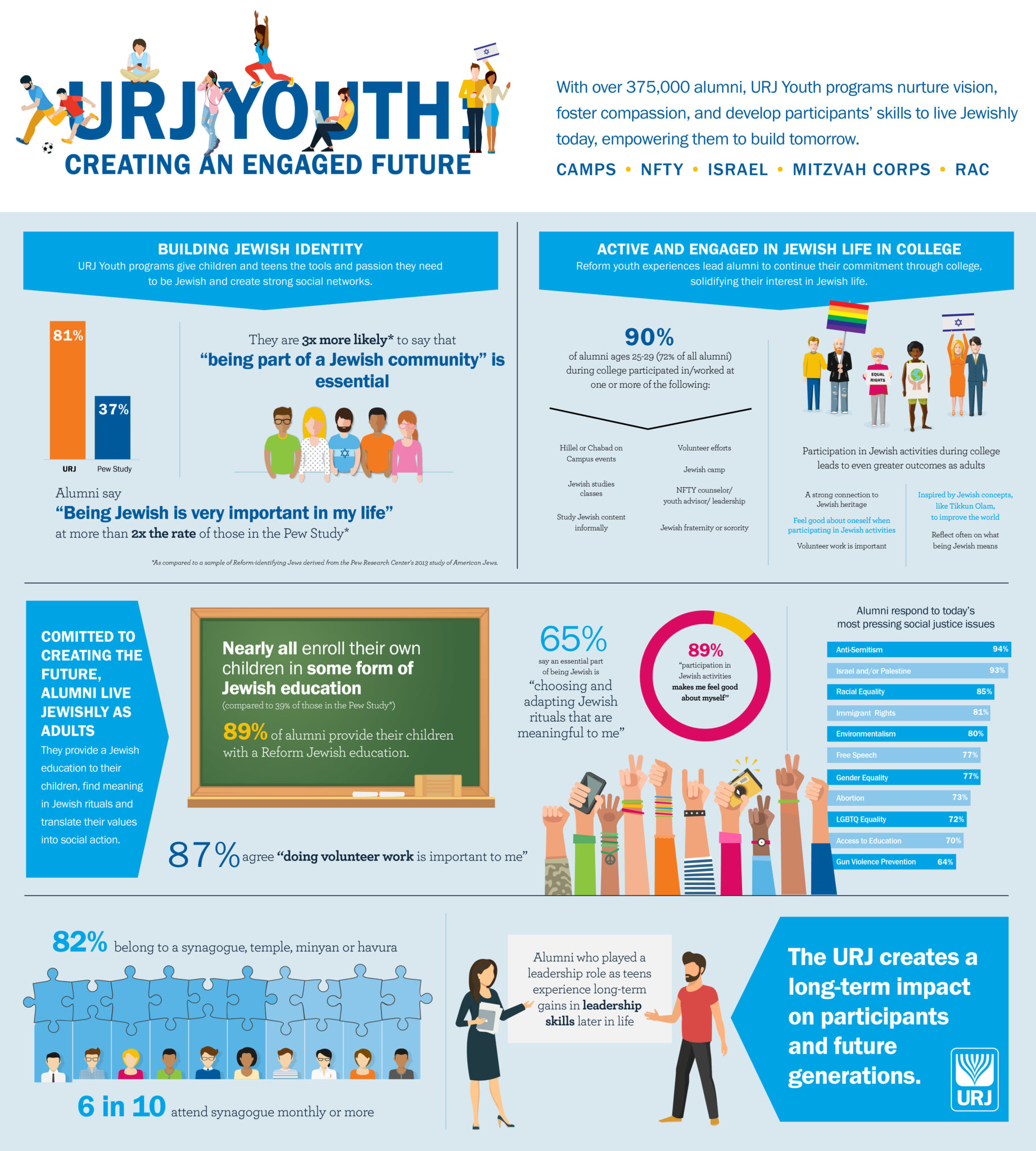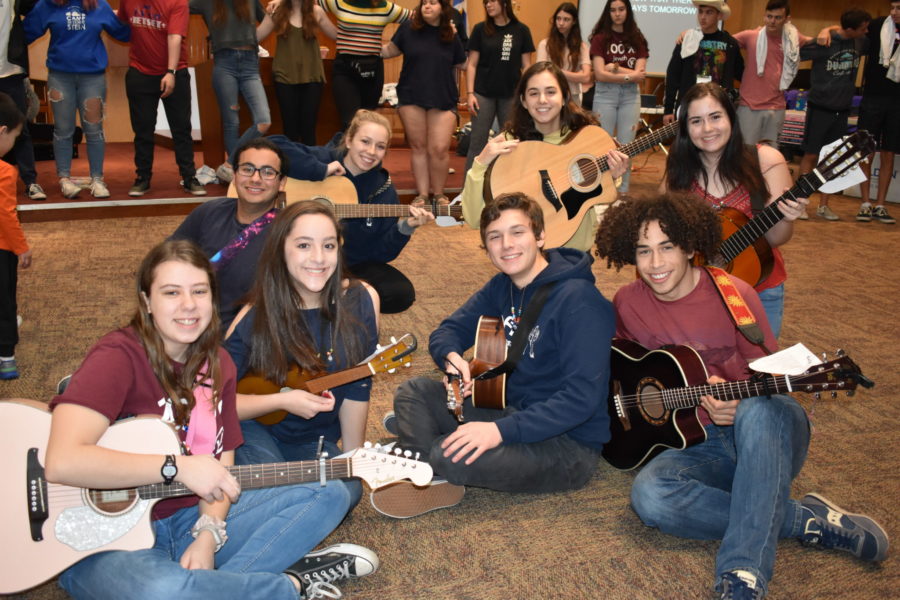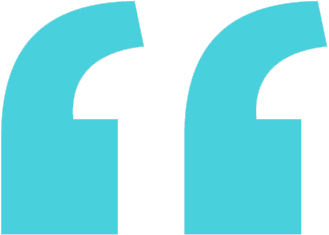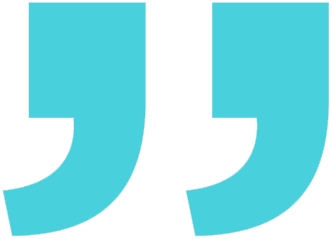Challenge
In Fall 2017, the Union for Reform Judaism (URJ) engaged Rosov Consulting to measure the lifelong impact of URJ youth programs in order to know if its youth programs are achieving the goals to strengthen communities that transform the way people connect to Jewish life and build a more whole, just, and compassionate world. By measuring against these organizational objectives, which often went beyond the traditional measures such as whether alumni are married to other Jews or lighting Shabbat candles each week, Rosov Consulting measured how Reform youth experiences such as URJ camps, NFTY, and congregations help alumni flourish as Reform Jewish adults (age 25 and older) while inspiring them to positively impact the world. The design of the study challenged what the Jewish community often defines as “success,” in terms of Jewish continuity, by measuring one’s orientation to society and to the broader world.
While this study was underway, the URJ began its involvement in the landmark study, GenZ Now: Understanding and Engaging Jewish Teens Today, for which Rosov Consulting was gathering and analyzing all the data in coordination with the URJ and 13 other youth-serving organizations (YSOs) to measure the influence of YSOs on Jewish youth. GenZ Now sought to survey tens of thousands of teens to measure how and to what extent their engagement in Jewish life achieved the 14 GenNow Outcomes, which define the ways that Jewish teen education and engagement experiences can help teens flourish.
With these two projects underway concurrently, both the URJ and Rosov Consulting saw a unique opportunity to align the studies to enable the URJ to compare how its programs both influenced teens (the GenZ Now study) and if/how its programs continued to influence those individuals once they were alumni of those programs—in other words once they matured into adulthood.
Approach
Both studies were groundbreaking in that they attempted to understand how being involved in Jewish life helps make one a better person, who in turn makes the world a better place. Aligning the studies in this manner would enable the URJ to compare findings between the studies and to understand its impact on participants during their programmatic years and beyond. The URJ and Rosov Consulting worked to ensure that the survey questions in the URJ Alumni Impact study and the questions the URJ included in the GenZ Now study explored similar topics and shared language and framing. This would help URJ draw a “through-line” from its work with teens through NFTY and its camps—and its impact on them during those years—to the ongoing impact of their work into adulthood. With this consistent approach, URJ would have a picture of its relationship with an individual through a significant portion of their lifetime.
The URJ youth study surveyed more than 3,000 alumni (aged 25+) from among more than 375,000 alumni of URJ youth programs, comparing their aggregate response to a comparable sample in the Pew Center’s 2013 Portrait of Jewish Americans.
GenZ Now: Understanding and Engaging Jewish Teens Today surveyed more than 17,500 teens through 14 different YSOs.
Results

Approaching both studies in this coordinated manner proved beneficial to the URJ as anticipated.
The URJ Alumni Impact study found that “the URJ’s youth programs create quality, lifelong Jewish outcomes, the benefits of which are “paid forward” at least one generation. The research points to a continuum of influence that starts during a person’s childhood and youth, endures through their college years, and sees expression in Jewish engagement and identification during adulthood, even many years later.”
The outcomes of the Gen Z Now study clustered around four themes – self and relations; Jewish peoplehood and Israel; social action; and Jewish life and heritage. The URJ’s findings from its involvement in the GenZ Now study showed that the URJ has the most impact on teens in the areas of social justice and tikkun olam.
Beyond this unique approach and deep findings of each study on its own, the URJ was able to integrate both studies together and leverage them within its organization. The URJ now says that what it sees in the GenZ Now findings help it understand the continued impact it has on people into adulthood. At the same time, learnings from the Alumni Impact study helped the URJ identify measures to fully understand how its youth engagement work helps people become more fulfilled and more successful in life, while also making them committed to improving their communities and the world.
The URJ recognizes that there are different ways to achieve the impact it wants. The URJ leads the largest Jewish movement in North America, representing nearly 900 member congregations. Critically, the URJ says that the data will allow them to inspire congregations to build on and renew program frameworks they have been operating for generations at scale and amplify the outcomes across thousands of teens and communities across North America. The URJ is using the findings from both studies to do just that. In 2019 and 2020, the URJ is:
- Piloting new teen leadership development opportunities
- Incorporating the study findings into program design across all youth programs – URJ camps, Israel trips, NFTY, fellowships, and more
- Introducing new tools such as online learning courses for member congregations to understand and begin to apply the research to their work


